
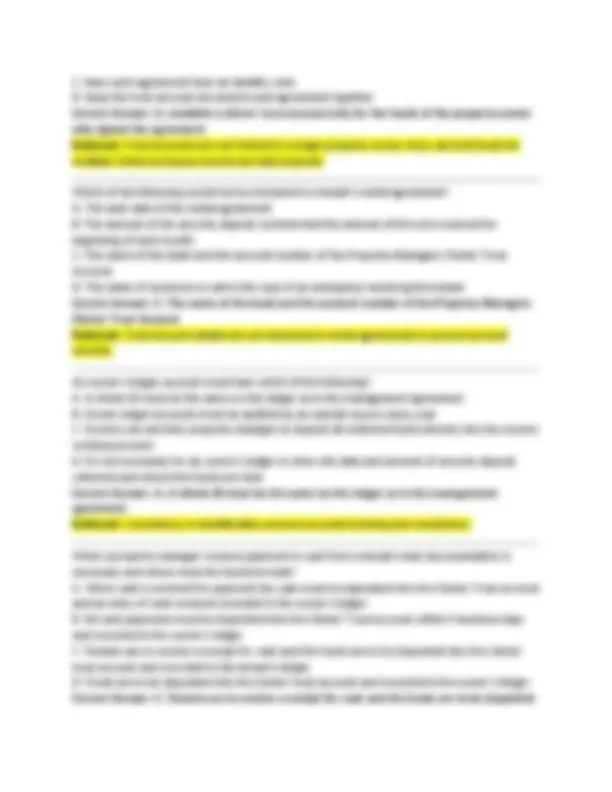
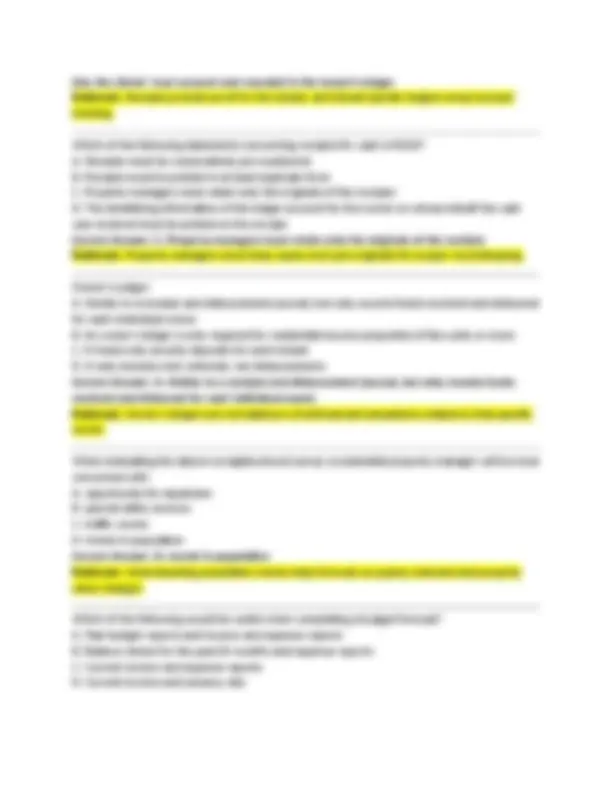
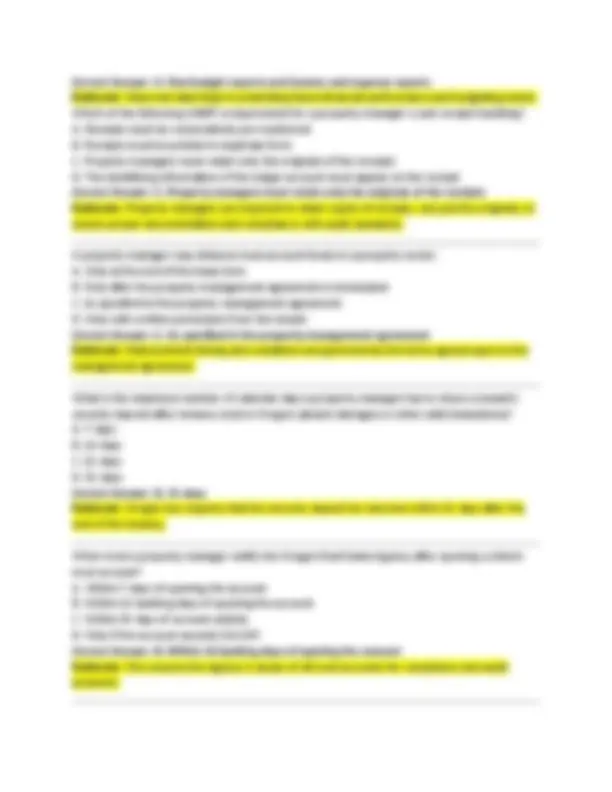
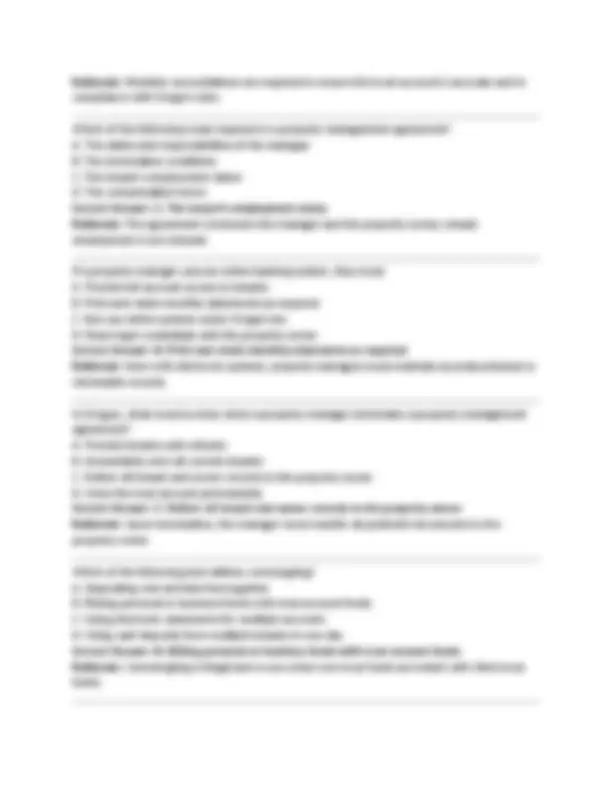
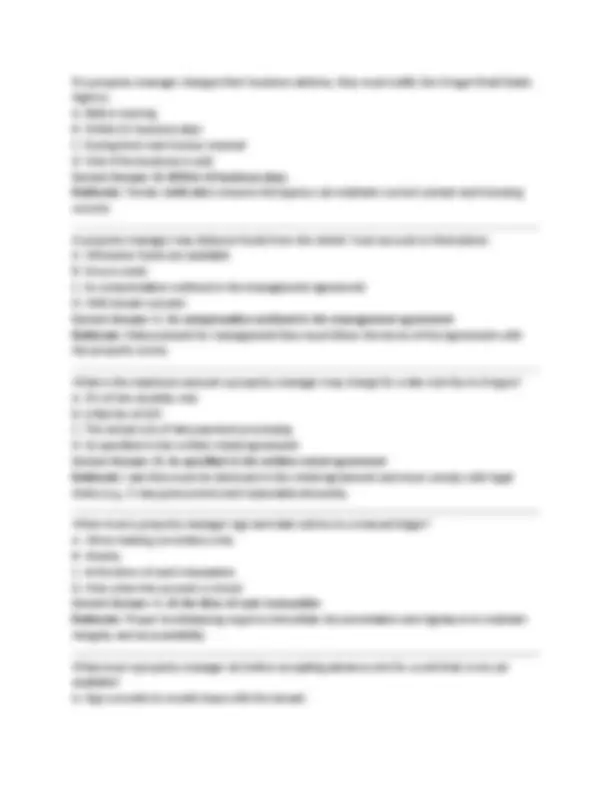
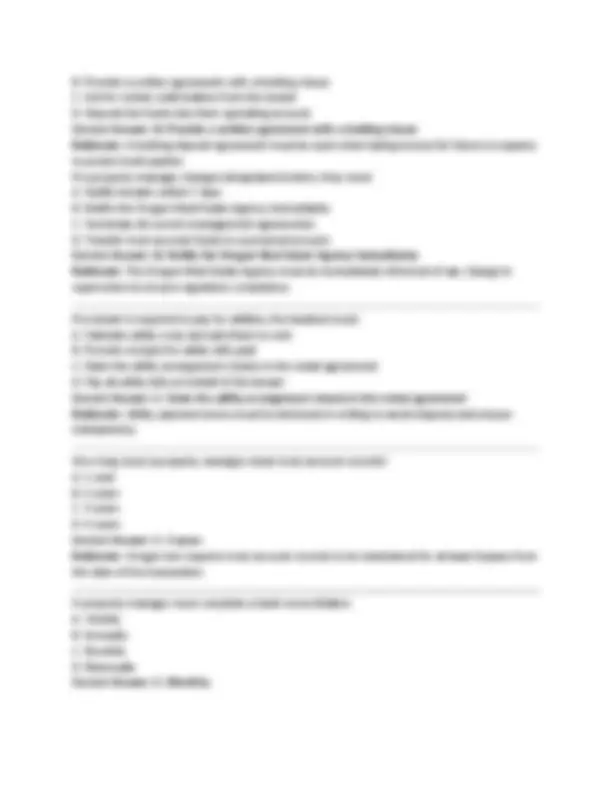
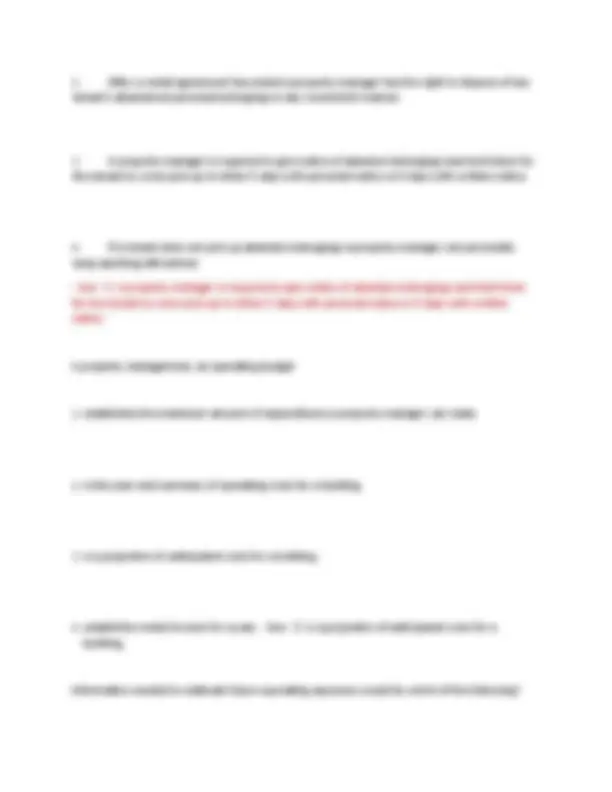




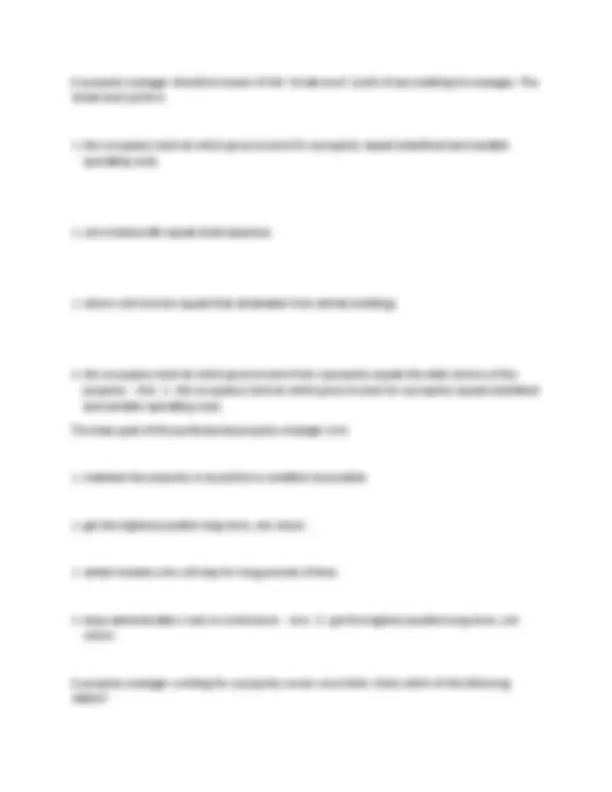
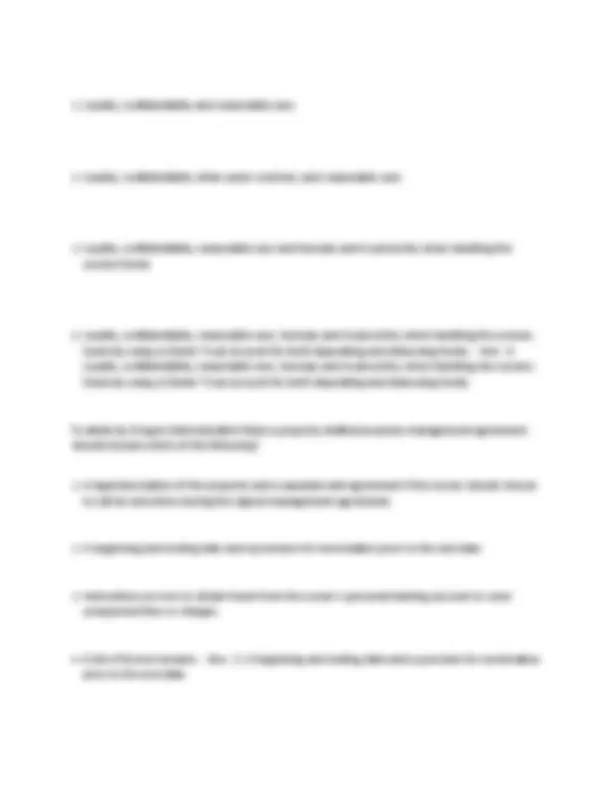

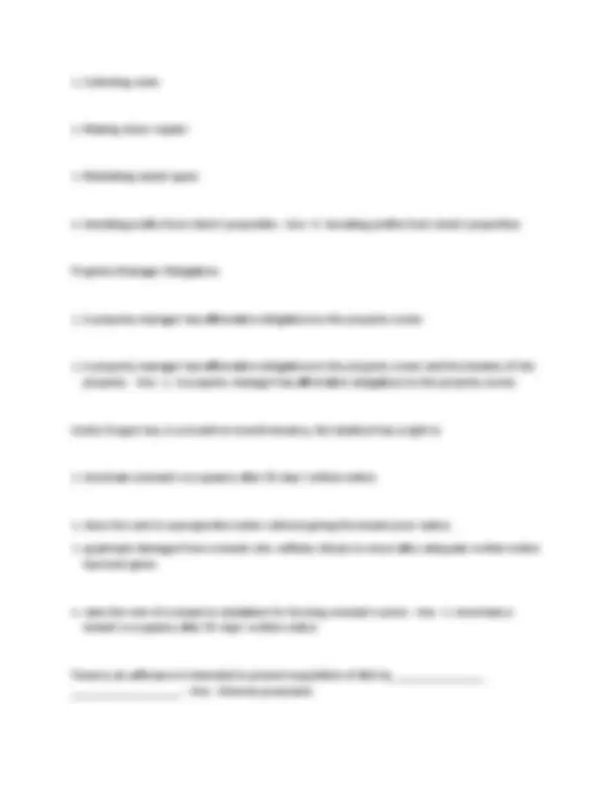



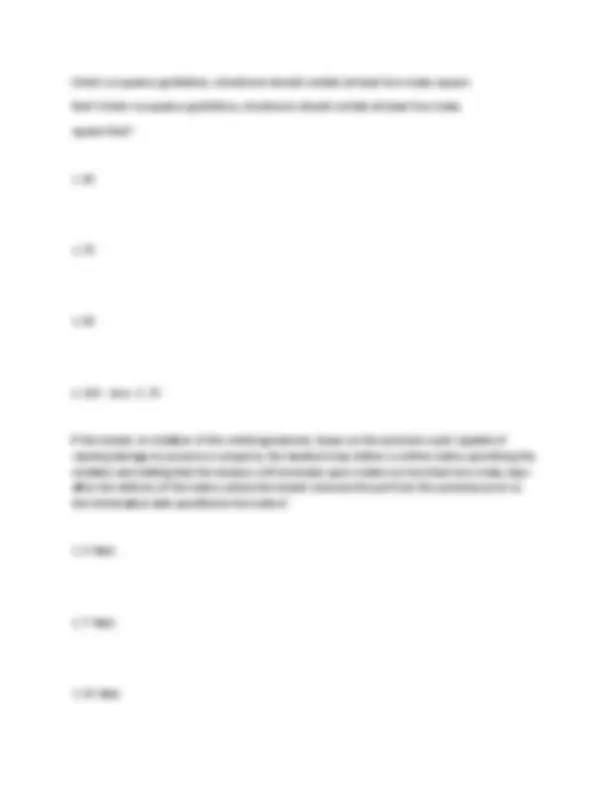
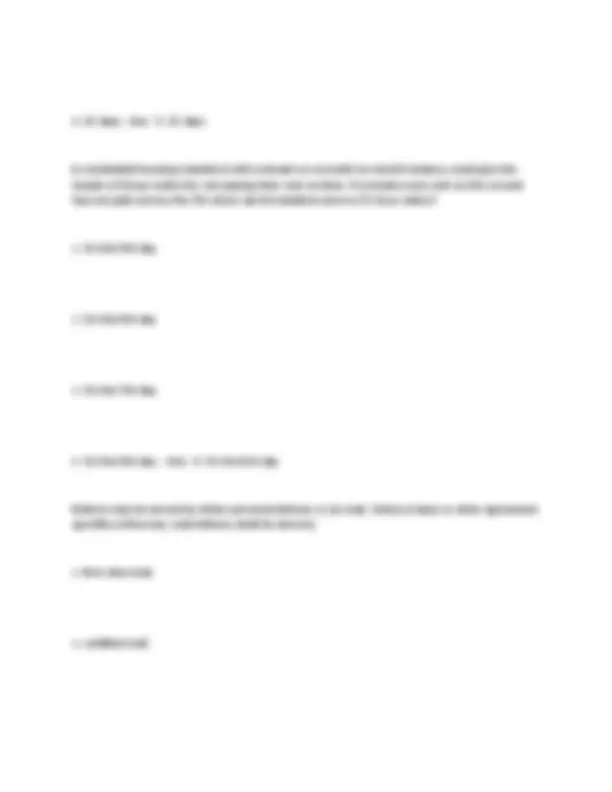

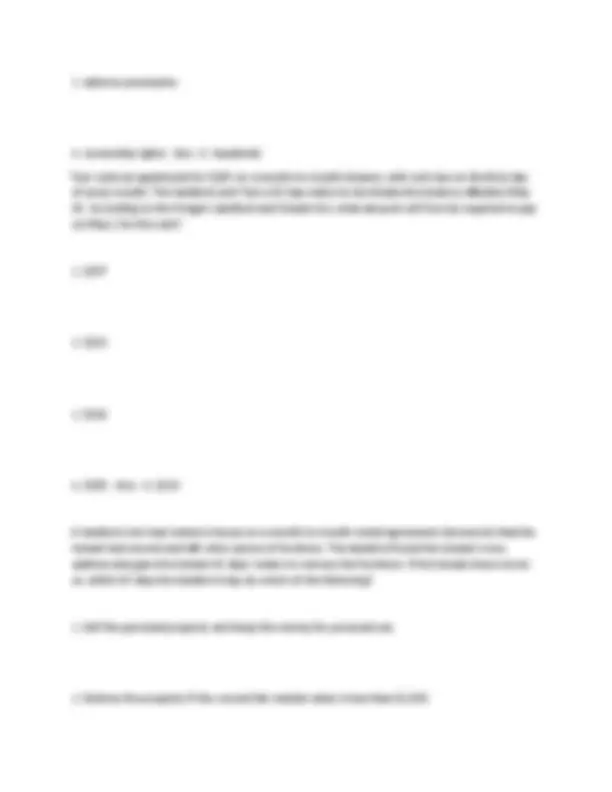
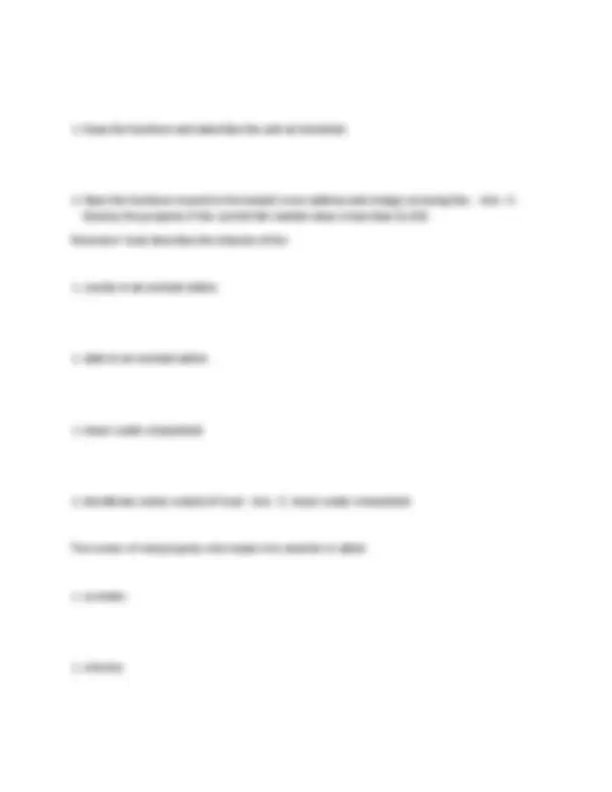


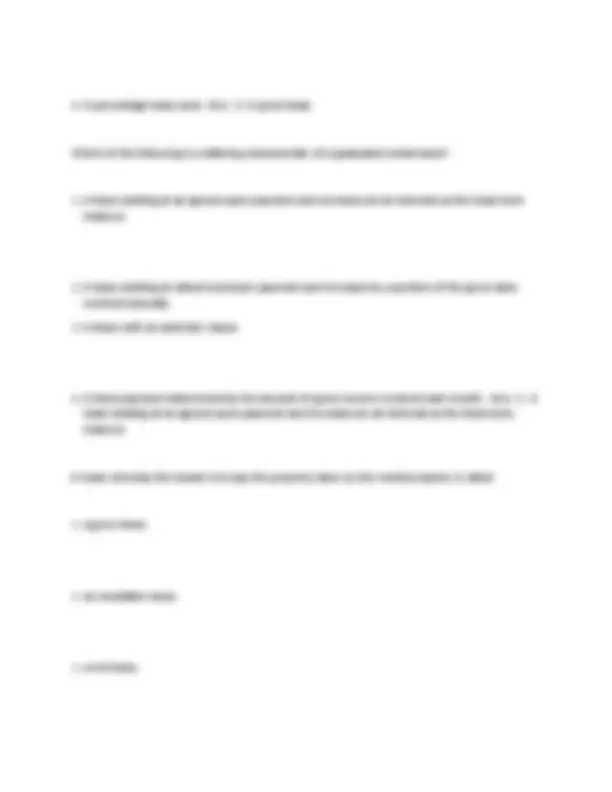
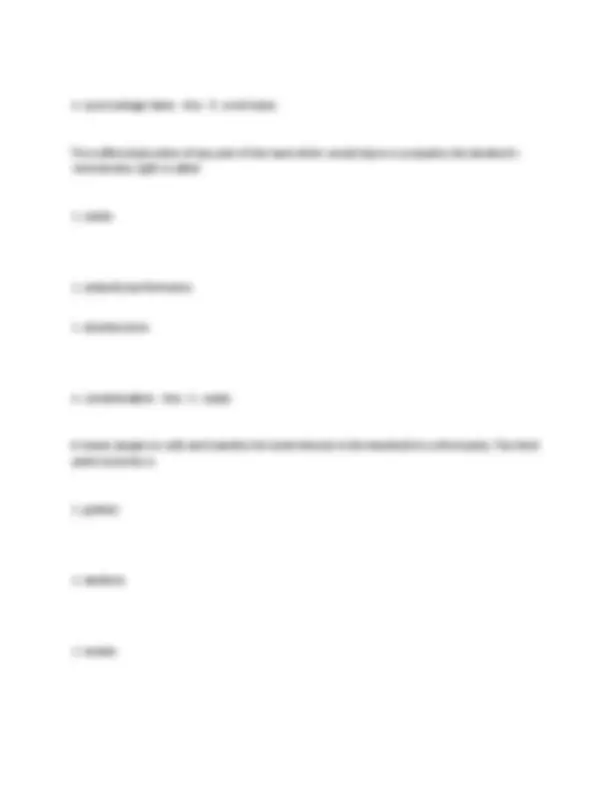
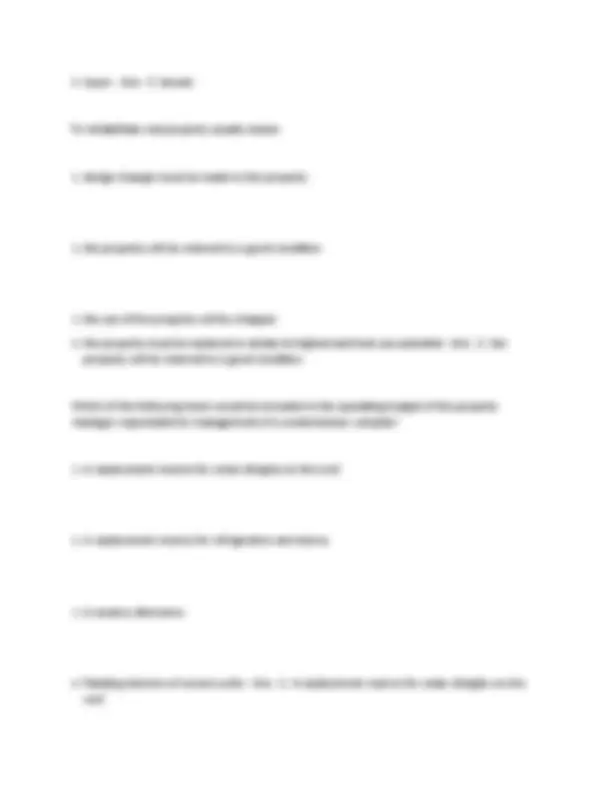
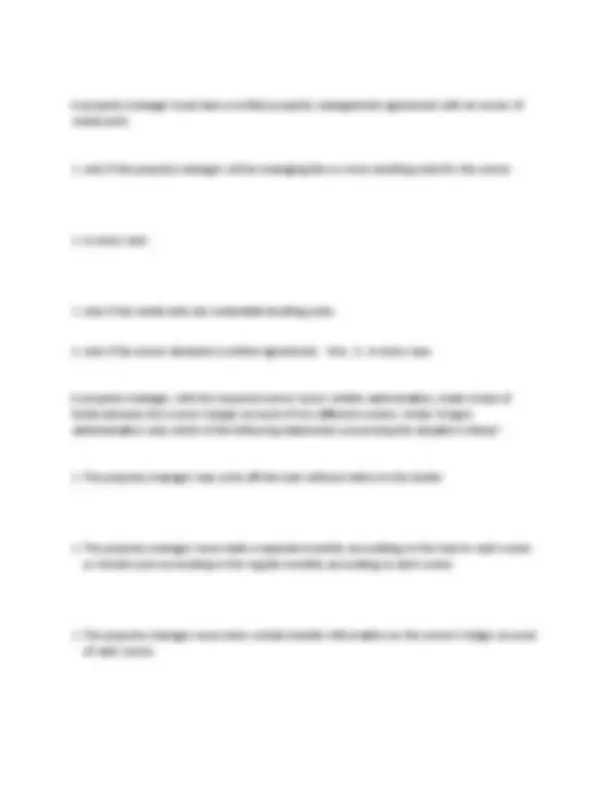
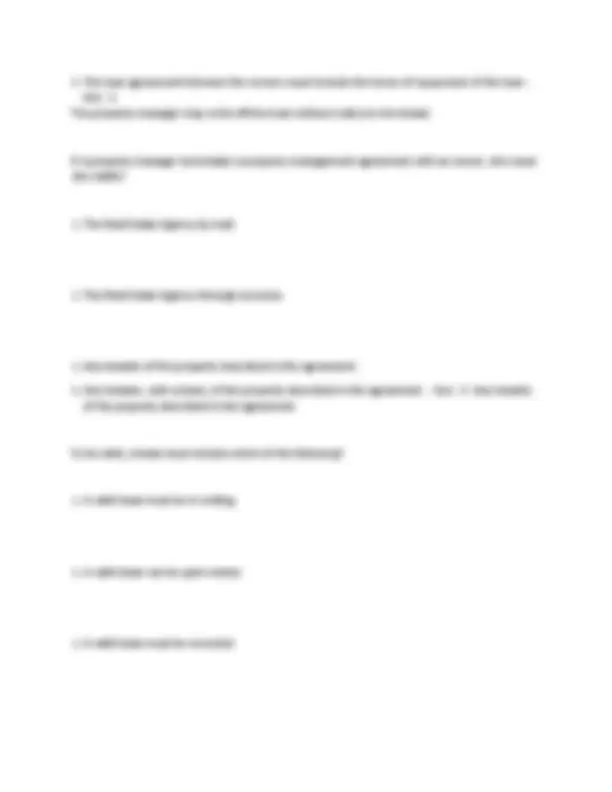



Study with the several resources on Docsity

Earn points by helping other students or get them with a premium plan


Prepare for your exams
Study with the several resources on Docsity

Earn points to download
Earn points by helping other students or get them with a premium plan
Community
Ask the community for help and clear up your study doubts
Discover the best universities in your country according to Docsity users
Free resources
Download our free guides on studying techniques, anxiety management strategies, and thesis advice from Docsity tutors
A property manager may NOT remove a motor vehicle that is not abandoned from the rental premises without notice to the owner or operator if the vehicle: A. blocks emergency access to the premises B. blocks entry to the premises C. violates a prominently posted parking violation sign D. has a flat tire Correct Answer: D. has a flat tire Rationale: A vehicle simply having a flat tire does not justify removal without notice; it does not present an immediate hazard or obstruction. In Oregon, a security deposit is: A. a nonrefundable fee B. a fee to secure the rental of a property C. a refundable payment or deposit D. a nonrefundable payment or deposit Correct Answer: C. a refundable payment or deposit Rationale: Under Oregon law, a security deposit is refundable, intended to cover potential damages or unpaid rent.
Typology: Exams
1 / 39

This page cannot be seen from the preview
Don't miss anything!
































A property manager may NOT remove a motor vehicle that is not abandoned from the rental premises without notice to the owner or operator if the vehicle: A. blocks emergency access to the premises B. blocks entry to the premises C. violates a prominently posted parking violation sign D. has a flat tire Correct Answer: D. has a flat tire Rationale: A vehicle simply having a flat tire does not justify removal without notice; it does not present an immediate hazard or obstruction. In Oregon, a security deposit is: A. a nonrefundable fee B. a fee to secure the rental of a property C. a refundable payment or deposit D. a nonrefundable payment or deposit Correct Answer: C. a refundable payment or deposit Rationale: Under Oregon law, a security deposit is refundable, intended to cover potential damages or unpaid rent. According to the Oregon Residential Landlord Tenant Act, select the correct definition of a fee: A. Any money charged to a tenant is a fee B. A nonrefundable payment of money by a tenant is a fee C. Any refundable payment of money by a tenant is a fee D. In Oregon it is illegal to charge fees to tenants Correct Answer: B. A nonrefundable payment of money by a tenant is a fee Rationale: In Oregon, a “fee” is defined as a nonrefundable charge, unlike a deposit, which is refundable. Delivery of notice must include: A. a notice by certified mail B. a written notice, provided by an attorney C. a verbal or written notice by either party
D. the date of recording Correct Answer: C. a verbal or written notice by either party Rationale: Oregon law allows for either verbal or written notice, making it flexible for landlord or tenant communication. Which of the following best describes premises? A. A dwelling unit occupied by someone other than the owner B. A dwelling unit occupied by the owner C. A parcel of land and dwelling unit occupied by someone other than the owner D. A parcel of property occupied by someone other than the owner Correct Answer: C. A parcel of land and dwelling unit occupied by someone other than the owner Rationale: “Premises” includes both the land and dwelling unit, distinguishing it from just the structure. A property manager must keep a __________, _______________ copy of each tenant's rental agreement. A. false, handwritten B. true, legible C. notarized, printed D. scanned, encrypted Correct Answer: B. true, legible Rationale: Property managers must maintain an accurate and readable copy of all rental agreements for legal and operational reasons. A property manager must give the property owner a copy of the property management agreement: A. by the end of the third working day after all parties have signed the agreement B. within one week C. within 30 days D. promptly Correct Answer: D. promptly Rationale: The law requires prompt delivery to ensure transparency and recordkeeping for the owner. After the execution of a valid property management agreement, the property manager must do all of the following EXCEPT: A. establish a clients' trust account only for the funds of the property owner who signed the agreement B. give a legible copy of the agreement to the owner
into the clients' trust account and recorded in the tenant's ledger Rationale: Receipts provide proof for the tenant, and tenant-specific ledgers ensure proper tracking. Which of the following statements concerning receipts for cash is FALSE? A. Receipts must be consecutively pre-numbered B. Receipts must be printed in at least duplicate form C. Property managers must retain only the originals of the receipts D. The identifying information of the ledger account for the owner on whose behalf the cash was received must be printed on the receipt Correct Answer: C. Property managers must retain only the originals of the receipts Rationale: Property managers must keep copies (not just originals) for proper recordkeeping. Owner's Ledger: A. Similar to a receipts and disbursement journal, but only records funds received and disbursed for each individual owner B. An owner's ledger is only required for residential income properties of five units or more C. It tracks only security deposits for each tenant D. It only includes rent collected, not disbursements Correct Answer: A. Similar to a receipts and disbursement journal, but only records funds received and disbursed for each individual owner Rationale: Owner's ledgers are a breakdown of all financial transactions related to that specific owner. When evaluating the data in a neighborhood survey a residential property manager will be most concerned with: A. opportunity for expansion B. special utility services C. traffic counts D. trends in population Correct Answer: D. trends in population Rationale: Understanding population trends helps forecast occupancy demand and property value changes. Which of the following would be useful when completing a budget forecast? A. Past budget reports and income and expense reports B. Balance sheets for the past 24 months and expense reports C. Current income and expense reports D. Current income and vacancy rate
Correct Answer: A. Past budget reports and income and expense reports Rationale: Historical data helps in predicting future financial performance and budgeting needs. Which of the following is NOT a requirement for a property manager's cash receipt handling? A. Receipts must be consecutively pre-numbered B. Receipts must be printed in duplicate form C. Property managers must retain only the originals of the receipts D. The identifying information of the ledger account must appear on the receipt Correct Answer: C. Property managers must retain only the originals of the receipts Rationale: Property managers are required to retain copies of receipts, not just the originals, to ensure proper documentation and compliance with audit standards. A property manager may disburse trust account funds to a property owner: A. Only at the end of the lease term B. Only after the property management agreement is terminated C. As specified in the property management agreement D. Only with written permission from the tenant Correct Answer: C. As specified in the property management agreement Rationale: Disbursement timing and conditions are governed by the terms agreed upon in the management agreement. What is the maximum number of calendar days a property manager has to return a tenant’s security deposit after tenancy ends in Oregon (absent damages or other valid deductions)? A. 7 days B. 14 days C. 21 days D. 31 days Correct Answer: D. 31 days Rationale: Oregon law requires that the security deposit be returned within 31 days after the end of the tenancy. When must a property manager notify the Oregon Real Estate Agency after opening a clients' trust account? A. Within 7 days of opening the account B. Within 10 banking days of opening the account C. Within 30 days of account activity D. Only if the account exceeds $10, Correct Answer: B. Within 10 banking days of opening the account Rationale: This ensures the Agency is aware of all trust accounts for compliance and audit purposes.
D. Consider the lease terminated and rent forgiven Correct Answer: C. Follow legal procedures for storing and notifying the tenant about their belongings Rationale: Oregon law requires specific steps to notify and hold property before disposal to protect tenant rights. Which of the following statements about Oregon property management agreements is true? A. They must be signed by the tenant and landlord B. They must include the property manager’s license number C. They are verbal agreements by default D. They can be backdated to the beginning of a lease Correct Answer: B. They must include the property manager’s license number Rationale: A valid agreement must include identifying information for the licensed property manager. What is the purpose of the tenant ledger? A. To track the owner’s payments to the manager B. To record tenant complaints and maintenance issues C. To document all charges and payments related to a specific tenant D. To show property appreciation over time Correct Answer: C. To document all charges and payments related to a specific tenant Rationale: The tenant ledger serves as the financial record of a tenant’s transactions, including rent payments, deposits, and any charges. When a property manager receives a check from a tenant that is not honored by the bank, the manager must: A. Deposit it again immediately B. Deduct the amount from their commission C. Reverse the deposit entry and notify the tenant D. Discard the check and charge a late fee Correct Answer: C. Reverse the deposit entry and notify the tenant Rationale: A dishonored check must be properly recorded and corrected in the accounting system and the tenant informed. How often must a property manager reconcile the clients’ trust account? A. Quarterly B. Monthly C. Annually D. Only when there is an error Correct Answer: B. Monthly
Rationale: Monthly reconciliations are required to ensure the trust account is accurate and in compliance with Oregon rules. Which of the following is not required in a property management agreement? A. The duties and responsibilities of the manager B. The termination conditions C. The tenant’s employment status D. The compensation terms Correct Answer: C. The tenant’s employment status Rationale: The agreement is between the manager and the property owner; tenant employment is not relevant. If a property manager uses an online banking system, they must: A. Provide full account access to tenants B. Print and retain monthly statements as required C. Not use online systems under Oregon law D. Share login credentials with the property owner Correct Answer: B. Print and retain monthly statements as required Rationale: Even with electronic systems, property managers must maintain accurate physical or retrievable records. In Oregon, what must be done when a property manager terminates a property management agreement? A. Provide tenants with refunds B. Immediately evict all current tenants C. Deliver all tenant and owner records to the property owner D. Close the trust account permanently Correct Answer: C. Deliver all tenant and owner records to the property owner Rationale: Upon termination, the manager must transfer all pertinent documents to the property owner. Which of the following best defines commingling? A. Depositing rent and late fees together B. Mixing personal or business funds with trust account funds C. Using electronic statements for multiple accounts D. Using cash deposits from multiple tenants in one day Correct Answer: B. Mixing personal or business funds with trust account funds Rationale: Commingling is illegal and occurs when non-trust funds are mixed with client trust funds.
B. Provide a written agreement with a holding clause C. Ask for verbal confirmation from the tenant D. Deposit the funds into their operating account Correct Answer: B. Provide a written agreement with a holding clause Rationale: A holding deposit agreement must be used when taking money for future occupancy to protect both parties If a property manager changes designated brokers, they must: A. Notify tenants within 7 days B. Notify the Oregon Real Estate Agency immediately C. Terminate all current management agreements D. Transfer trust account funds to a personal account Correct Answer: B. Notify the Oregon Real Estate Agency immediately Rationale: The Oregon Real Estate Agency must be immediately informed of any change in supervision to ensure regulatory compliance. If a tenant is required to pay for utilities, the landlord must: A. Estimate utility costs and add them to rent B. Provide receipts for utility bills paid C. State the utility arrangement clearly in the rental agreement D. Pay all utility bills on behalf of the tenant Correct Answer: C. State the utility arrangement clearly in the rental agreement Rationale: Utility payment terms must be disclosed in writing to avoid disputes and ensure transparency. How long must a property manager retain trust account records? A. 1 year B. 2 years C. 3 years D. 6 years Correct Answer: C. 3 years Rationale: Oregon law requires trust account records to be maintained for at least 3 years from the date of the transaction. A property manager must complete a bank reconciliation: A. Weekly B. Annually C. Monthly D. Biannually Correct Answer: C. Monthly
Rationale: Monthly reconciliations are required to verify account balances and ensure all funds are properly accounted for. Which of the following may be charged as a nonrefundable fee under Oregon law? A. A pet deposit B. Cleaning deposit C. Application fee D. Security deposit Correct Answer: C. Application fee Rationale: Application fees may be nonrefundable , while deposits (like security or cleaning) must be refundable unless otherwise agreed in writing. Which of the following is true regarding trust account interest earned in Oregon? A. Property managers may keep it for administrative costs B. It must always be returned to the tenant C. It must be allocated according to the written agreement D. It is sent to the Oregon Department of Revenue Correct Answer: C. It must be allocated according to the written agreement Rationale: The handling of interest must follow the written agreement with the property owner and/or tenant. The term “clients’ trust account” refers to: A. The manager’s personal bank account used for client payments B. A business savings account for the property manager C. A separate account for holding money received on behalf of clients D. A line of credit used by clients to make rent payments Correct Answer: C. A separate account for holding money received on behalf of clients Rationale: Trust accounts are legally required accounts used to hold other people's money (e.g., rent, deposits) separate from personal or business funds. Under Oregon law, a property manager who knowingly commingles client funds may face: A. A written warning only B. Suspension or revocation of their license C. A tenant complaint D. An IRS penalty Correct Answer: B. Suspension or revocation of their license Rationale: Commingling client funds is a serious violation and can lead to disciplinary action by the Oregon Real Estate Agency.
A property manager should be aware of the "break even" point of any building he manages. The break even point is